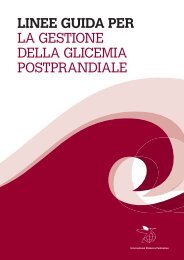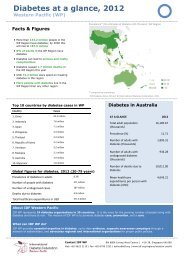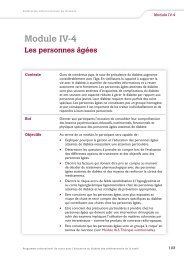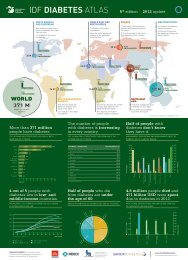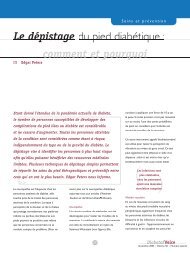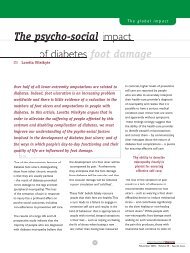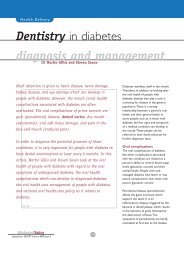Global guideline on pregnancy and diabetes - International ...
Global guideline on pregnancy and diabetes - International ...
Global guideline on pregnancy and diabetes - International ...
You also want an ePaper? Increase the reach of your titles
YUMPU automatically turns print PDFs into web optimized ePapers that Google loves.
<str<strong>on</strong>g>Global</str<strong>on</strong>g> Guideline <strong>on</strong> Pregnancy <strong>and</strong> Diabetes<br />
Women already known to have <strong>diabetes</strong> (sometimes<br />
called ‘pre-gestati<strong>on</strong>al <strong>diabetes</strong>’ in this c<strong>on</strong>text) need to<br />
c<strong>on</strong>sider how the effects of their <strong>pregnancy</strong> may impact<br />
<strong>on</strong> the <strong>diabetes</strong>, <strong>and</strong> <strong>on</strong> any of their <strong>diabetes</strong>-associated<br />
problems. Hypoglycaemia is more likely to occur in <strong>pregnancy</strong>,<br />
especially in the first trimester, as a greater effort is<br />
made to attain <strong>and</strong> maintain glycaemic c<strong>on</strong>trol. A variable<br />
dietary intake associated with morning sickness may also<br />
increase this tendency towards hypoglycaemia. Women<br />
with established diabetic complicati<strong>on</strong>s, such as retinopathy<br />
or nephropathy, may experience a worsening during<br />
the <strong>pregnancy</strong>. These aspects should ideally be assessed<br />
prior to any <strong>pregnancy</strong> <strong>and</strong>/or at such intervals during the<br />
<strong>pregnancy</strong> as clinically indicated.<br />
3.2 Review of medicati<strong>on</strong>s<br />
Women with <strong>diabetes</strong> or previous GDM may be taking<br />
medicati<strong>on</strong>s c<strong>on</strong>tra-indicated in <strong>pregnancy</strong>. These include,<br />
but are not limited to, angiotensin c<strong>on</strong>verting enzyme<br />
(ACE) inhibitors, angiotensin-II receptor blockers (ARBs),<br />
calcium channel blockers <strong>and</strong> lipid lowering agents.<br />
In a large cohort study of <strong>pregnancy</strong> which excluded women<br />
with <strong>diabetes</strong>, first-trimester exposure to ACE inhibitors<br />
was associated with an increased risk of major c<strong>on</strong>genital<br />
malformati<strong>on</strong>s compared to the use of other anti-hypertensive<br />
agents [26]. If ACE inhibitors were being used to treat<br />
diabetic nephropathy prior to <strong>pregnancy</strong>, then a significant<br />
deteriorati<strong>on</strong> in proteinuria can be anticipated during the<br />
course of the <strong>pregnancy</strong> following disc<strong>on</strong>tinuati<strong>on</strong> [27,28].<br />
This aspect will need to be c<strong>on</strong>sidered when offering advice.<br />
There are theoretical problems potentially associated with<br />
the use of ARBs in <strong>pregnancy</strong>, but <strong>on</strong>ly very limited data <strong>on</strong><br />
this topic. Calcium channel blockers have the potential to<br />
cause fetal hypoxia <strong>and</strong> should be used cautiously if at all.<br />
For statins, c<strong>on</strong>genital malformati<strong>on</strong>s have been reported<br />
<strong>and</strong> there is c<strong>on</strong>cern that decreased cholesterol synthesis<br />
may affect fetal development [29], but evidence <strong>on</strong> use in<br />
<strong>pregnancy</strong> is very limited. Data <strong>on</strong> the use of fibrates <strong>and</strong><br />
niacin are also limited.<br />
These medicati<strong>on</strong>s need to be stopped as part of prec<strong>on</strong>cepti<strong>on</strong><br />
planning or as so<strong>on</strong> as a <strong>pregnancy</strong> is recognized.<br />
Sufficient blood pressure c<strong>on</strong>trol should be secured<br />
by using methyldopa or labetalol.<br />
In comm<strong>on</strong> with other women during <strong>pregnancy</strong>, women<br />
with <strong>diabetes</strong> need to ensure there is an adequate intake<br />
of folic acid.<br />
Women with type 2 <strong>diabetes</strong> who are taking either metformin<br />
<strong>and</strong>/or glyburide (glibenclamide) need to have the<br />
potential advantages <strong>and</strong> disadvantages of these medicati<strong>on</strong>s<br />
outlined <strong>and</strong> to c<strong>on</strong>tinue with them if it is in their<br />
best interests to do so.<br />
7<br />
Pregnancy_EN2.indd 7 16/09/09 15:42





